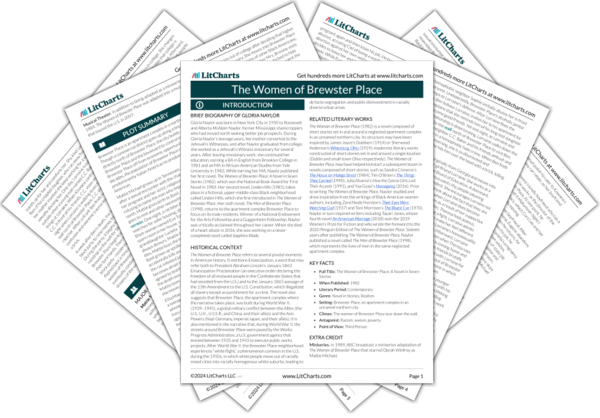Racism and Poverty
In The Women of Brewster Place, both interpersonal and structural racism threaten Black people’s lives, but especially structural racism in the form of poverty. While the characters do suffer occasionally from direct white violence—for example, Etta Mae Johnson has to flee her hometown in Tennessee when the relatives of the “horny white bastard” she sexually rejected form a small mob to lynch her—they suffer daily from the effects of poverty due to racist limitations placed…
read analysis of Racism and PovertySexism and Female Relationships
Experiences of sexism and abuse are fairly universal among the Black female protagonists in The Women of Brewster Place. Yet while those who forge strong bonds with other women survive despite sexism, those who are isolated from other women are driven to desperation. For example, Etta Mae Johnson has to flee her hometown after rejecting a white man’s unwanted sexual advances and falls into a series of mutually exploitative sexual liaisons with Black men…
read analysis of Sexism and Female RelationshipsSexuality
In The Women of Brewster Place, sexuality can be a positive and life-affirming force—but women who violate conservative social codes about sexuality are often punished with shame and violence. The novel asserts that sexuality can be a positive force in the story of Kiswana, a young woman from a middle-class Black family who has dropped out of college and moved into Brewster Place to get closer to the political problems affecting Black Americans…
read analysis of Sexuality
Motherhood
The Women of Brewster Place represents motherhood as vitally important, but it also shows the devastating results of motherhood gone awry. The novel represents the importance of motherhood in the relationship between Mattie and Ciel. Though Mattie is not Ciel’s biological mother, she lives in the same house as Ciel and Ciel’s grandmother Eva Turner and ultimately steps into a maternal role for Ciel. When, years later, Ciel’s baby daughter Serena dies in an…
read analysis of MotherhoodReligion
The Woman of Brewster Place represents religion as both a source of spiritual freedom and of social control, depending on who is practicing it and how. For example, the music at the Baptist services that Mattie Michael attends makes her feel spiritually free, and she derives strength and comfort from her religious practices. Yet, as a young woman, Mattie was chastised and severely beaten by her religious father for getting pregnant out of wedlock, showing…
read analysis of Religion






